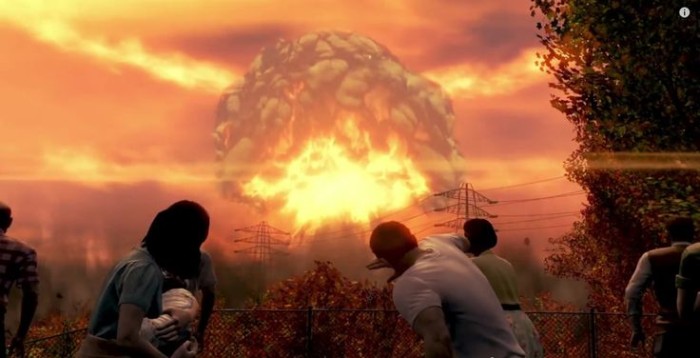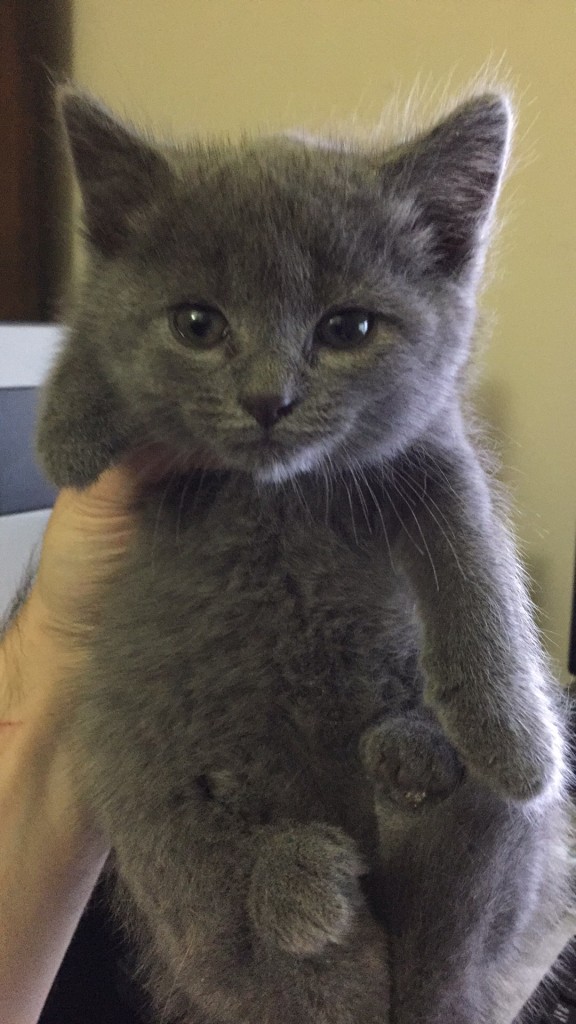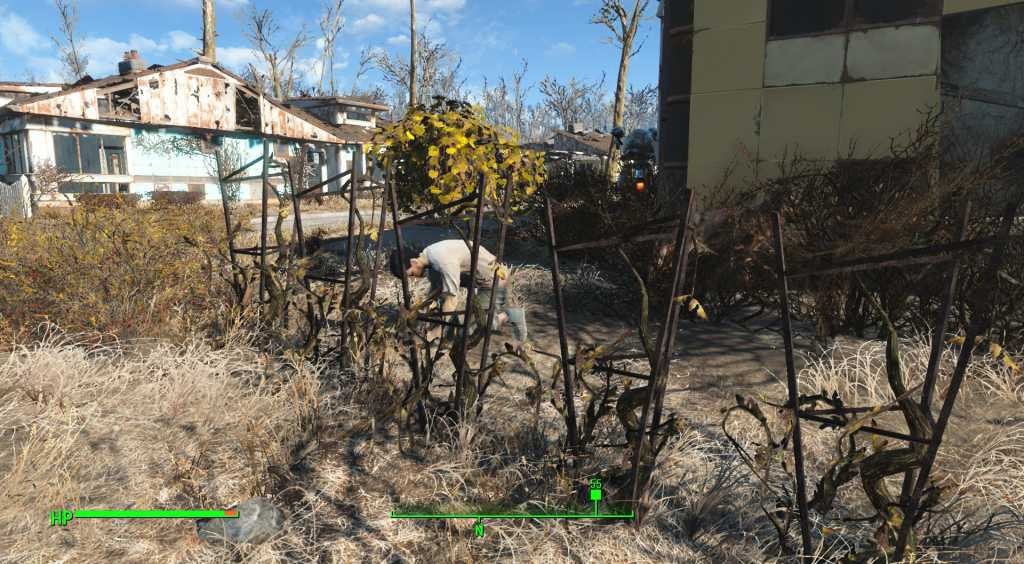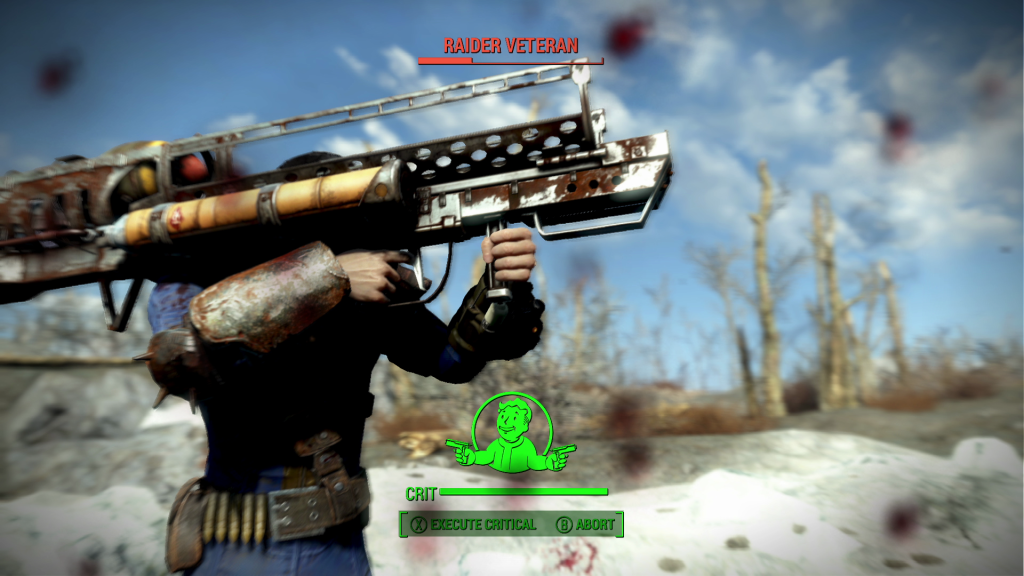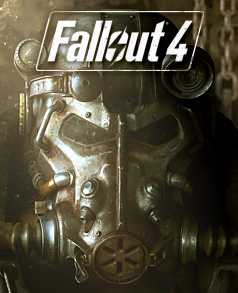
Okay, so I’ve thrown a bunch of time at Fallout 4 and I’m feeling the need to ‘review’ it / rant a little. The following post is going to contain a bunch of spoilers. Normally, I’d refrain from such a spoil heavy post, but everything I’m about to say is already spread across the internet, so people who are looking for spoilers have no trouble finding them. If you are concerned about ruining the plot (bear in mind a game would actually have to have a plot to ruin one), proceed at your own risk.
I have been a fan of Wasteland/Fallout since the mid 80s when Wasteland came out for the Commodore 64. Unfortunately, due to some legal wonkiness with Electronic Arts, the people who made the original Wasteland couldn’t use the name and so created Fallout 1, and later 2. Even more unfortunately, Black Isle Studios is no more… and Bethesda wound up doing Fallout 3. Now, I am firmly of the opinion that Wasteland/Fallout RPGs should be turn based, and the shift in Fallout 3 to a first-person shooter with a half-assed “Hey, this is a RPG, see… VATS!” mechanic did not impress me. I wound up waiting a long time before begrudgingly deciding to play Fallout 3… and while it lacked much of the feel and mood imparted to the world by Black Isle, it wasn’t too bad.
Fallout 4, alas, has lost this… and has replaced it with tedium and sameness.

Story Issues
First (and here’s where the spoilers will come into play), the game has a serious lack of story. What plot there is feels flat, rushed, and one-dimensional. Here are some of the story issues I found annoying/shoddy/jarring.

RIP – The creators of Fallout 1 and 2.
Missing Feel – Alas, Fallout 4 has completely lost every trace of its former creators’ sense of humor, wit, style, and the only thing it shares with the Fallout world is the name and the quasi-1950s nuclear aesthetic. In short, Fallout 4 is a dumbed-down “let’s squeeze this into a console” first person shooter “with RPG elements.”
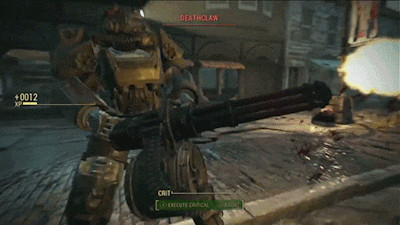
Fallout 4’s power armor.
Power Armor – For much of the series (and Wasteland), finding “power armor” was a late-game thing that gave you a feeling of accomplishment. After slogging through hours of play time and getting shot up over and over again, that moment when you find the ‘power armor,’ was like a gamer’s holy grail. In Fallout 4, they hand you a suit of power armor within 15-20 minutes of starting the game… and you wind up (at least I did) using it for that quest, and then leaving it behind.
I’ll get more into the implementation of the power armor in the design issues part of this post, but suffice to say any and all feeling of achievement or magic associated with the sacred cow of the Fallout world has been stripped away. Gone is the YES! Power armor! Feeling, replaced with, Oh, another walking trashcan.
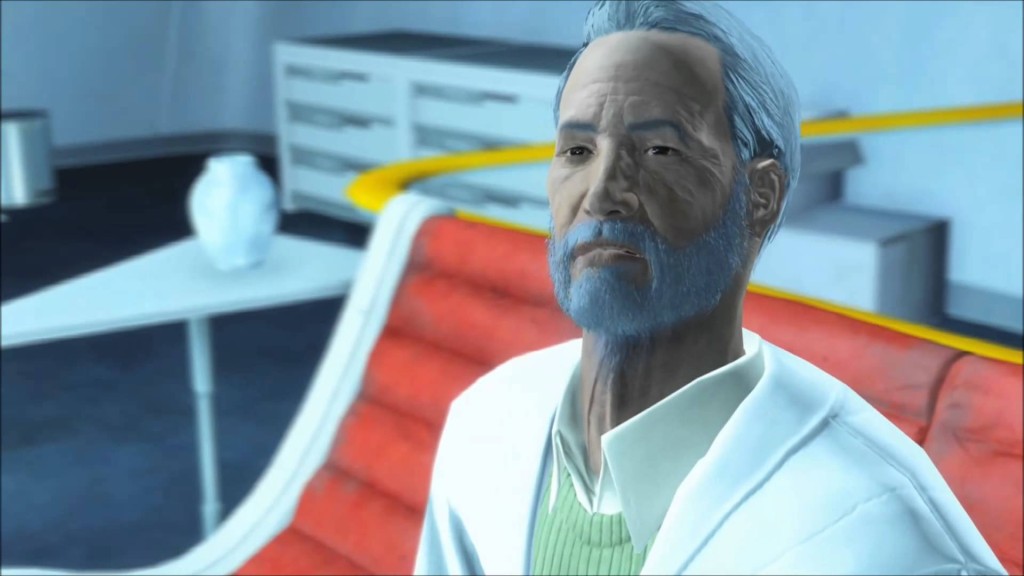
Father, the son?
Father – (Okay, spoiler time.) The game starts pre-nuke war, with you and your spouse (and baby) at home. After buying a space in the vault (convenient timing btw) – within 5 minutes of signing the vault tec contract, the bombs fall and you go running off to the vault. In keeping with the shady practices of Vault Tec, you wind up being tricked into cryogenic sleep as an experiment. You wake up, watch someone kill your spouse and take the baby, then get refrozen for what feels like a minute or two. Later, you wake up and learn that your son is now about 10 years old, and you start searching for him. Later, when you reach the Institute (more on that later), a sixty-year-old man claims to be your lost son, and just happens to be the leader of this Institute.
There is a dialogue option “bullshit” to say you don’t believe he is your son… but the only thing the dialogue comes back to that is “you’ll just have to take it on faith,” and the character has no option to demand proof. They have the technology to make human-like synths, but they can’t do a simple paternity/maternity test? Seriously? “Take it on faith?” They expect the character to just believe that this old man is their son without any proof – especially since for the entire game leading up to the point where you arrive at the Institute, everyone is filling your head with horror stories about how twisted, evil, and cruel the Institute is?
You know they hired a merc to abduct the baby, said merc kills your spouse, and your supposed ‘old man son’ refers to the loss of his father/mother as ‘acceptable collateral damage’? Horseshit. He’s either lying, or he’s a psychopath. The narrative never clears up if he really is your son or not, and I can’t tell if it’s because they did a crummy job trying to build up the institute to sound so evil, but when you get there they play the “misunderstood scientists feared by the ignorant people on the surface” or because they just did a bodge job and rushed this game out the door.
Second, it’s never explained why they feel the need to make human like synths in the first place. Are they trying to help the human race or replace it? It’s a scrap of a plot thread that’s waved about and discarded without an afterthought.
Replacing people – More on the point of the Institute being built up to be evil, while you are traveling the Commonwealth, you continuously hear stories that the Institute replaces living humans with synthetic replacements who appear to be human. No explanation is ever given WHY they do this. If you side with the Institute, you get a mission early on to bring seeds to a synth man who was inserted into a family (replacing the father) so they could test seeds topside. I’m asking WHY? Why replace people? Why not just set up a farm of ALL synths, and make them look like a normal group of settlers?
There’s some discontent at that farm, where the guy’s workers suspect he’s a synth and want to kill him… would it not make more sense to establish a small settlement of only synths to avoid this kind of problem? Also, aside from the flimsy “we need to make them sound like body snatching bad guys up until the player actually gets there” reason, there is never once any explanation given for why the Institute feels the need to replace people with synths. There are better ways to accomplish what they want to do, and this seems unnecessarily shady/evil to make them artificially “the bad guys” for the first 70% of the game, made worse by not giving the player the chance to understand/investigate any of these ‘dark deeds.’
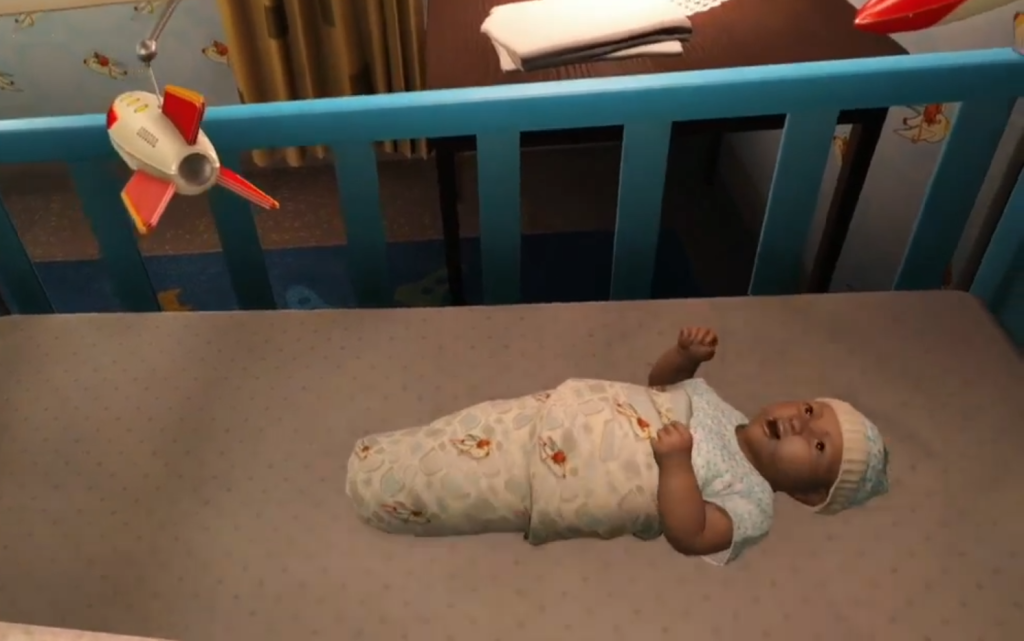
Your baby from the opening pre-game game.
Clean DNA – The reason provided by Father for the Institute abducting the player character’s infant son is that they needed a source of clean DNA untainted by the radiation of the surface world. I find this a bit feeble… the Institute has been living far underground in a sealed vault only accessible by teleportation for 200 years. How is it possible they are getting irradiated? Whenever the Institute humans go topside, they wear a full rad suit with a face mask – so they’re clearly considering themselves pure enough to need such protection to be on the surface… this makes the taking of the infant seem contrived. Plus, the merc killing the spouse felt like gratuitous horribleness. They want to keep the parents alive as backups. Kellogg is a trained mercenary, the spouse is groggy from cryo-stasis and unarmed. Couldn’t he have just knocked him/her out to keep them on ice for later use? Having him shoot the spouse who refuses to let go of the infant seems like overegging the pudding. More tragic!
Overstated effects of nuclear war – Two hundred years after the war and there’s still supposed to be glowing pools of radioactive muck lying about? People settle in Hiroshima and Nagasaki now, and it hasn’t been 200 years. (Granted, those weapons were low yield, but still…) The radiation is overdone for Hollywood effect… almost to a comedic level. ALL water is radioactive? Even running water in rivers? Seriously?
Factions – Second to the forced storyline of Father, the biggest story problem I had with Fallout 4 is the factions. I tend to like to take the ‘good guy’ option, but none of the factions offer a clear-cut sense of being the good guy. (I know some of you are probably thinking, it’s not all good and evil – and you’re right… but the problem is ALL of the factions are shady. With any one of them you pick, it feels like you’re on the bad guy’s side.
Minutemen – The first faction you meet, the MM are the most benign of the lot… up until the end. It seems like they are primarily concerned with establishing a people’s militia to protect settlers and the like from raiders, super mutants, and anything else that would attack them. Okay, fair enough… these guys seem like a decent option.
Most of their focus is on establishing settlements and performing an endless series of randomly generated “go here and kill this stuff to protect this settlement” missions. However, toward the end game, for no explainable reason, they get a bug up their ass about the Institute, and want to sabotage their nuclear reactor and set off yet another huge nuclear explosion in downtown Boston… killing thousands of innocent scientists (as well as the handful of bad ones making the Institute do wonky things.) So the benign protectors suddenly go all bloodthirsty… feels out of character.
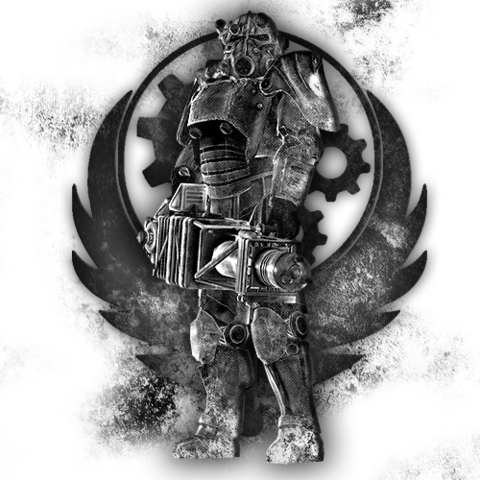
BoS – The Brotherhood of Steel – For the most part, unlike previous incarnations of Fallout, the BoS here feel like fascists. They, more than the Institute, left me feeling an ‘evil’ vibe. They want you to bully the citizens, steal their food, steal their tech, kill anything and everything that isn’t a pure human without so much as a hello… (though to their point, super mutants are hostile all the time except for two individuals you meet.)
Furthermore, when doing their quests and interacting with them, they are all condescending pricks to you. There is nothing likable about them at all (except for the free, easy upgrade to power armor.)
Later when something is revealed about a companion you’ve spent a lot of time with, one of their most trusted Paladins, the leader demands his death no questions asked, no regard for how much he’s done for them in the past. And of course, they want to nuke the institute because “no one can have tech but us.” Again, mass murder by nuke.
Railroad – These guys are a clandestine underground “resistance” movement who believe that synths are sentient beings entitled to rights. Okay, they sound noble… but if you listen to the Institute’s angle on this, the synthetics are machines running programs… and as much as they appear to be human and have emotions, it’s all software. Add to that, these guys are paranoid, fanatic (willing to kill any number of real humans to ‘free’ a machine), and again, want to nuke the Institute (killing thousands of innocent people – presumably since they’ve been living underground there’s also children there too.)
Later, it’s revealed that if the PC sides with the railroad, the synths band together and try to wipe out humanity. So yeah, these guys are loons. (Plus I found the Railroad companion to be extremely annoying.)
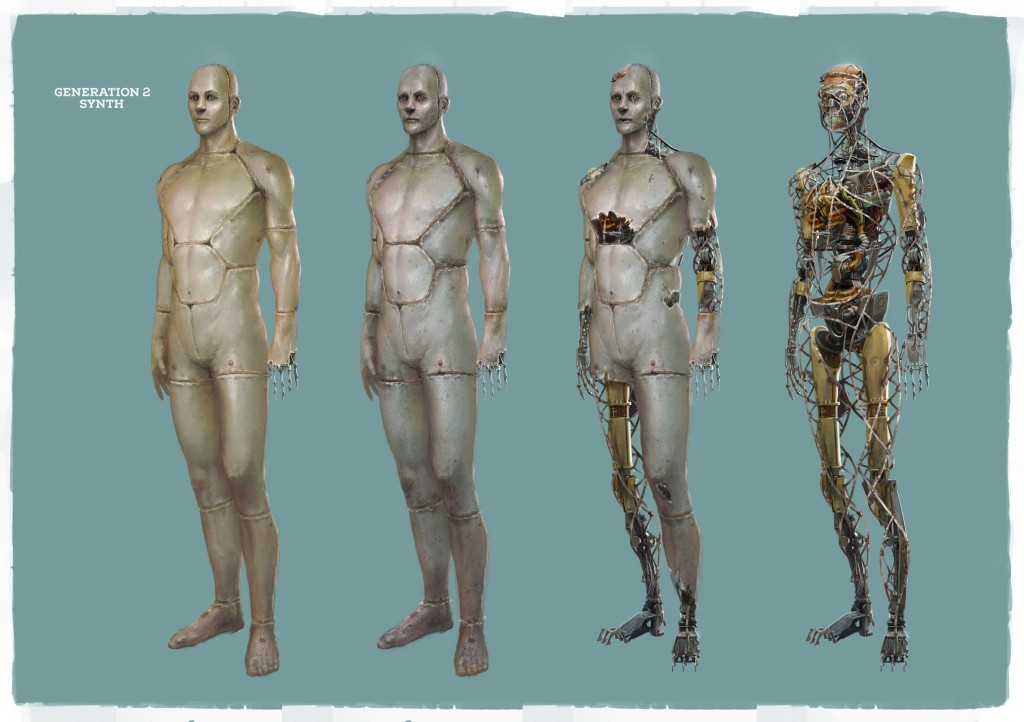
Institute – Portrayed by rumor as the big bad main antagonist of the game as soon as you start talking to people, the Institute is composed of scientists and doctors who have continued on with their development of technology as though the war never happened. Hiding under the university grounds, they’ve lived in isolation for 200 years and have developed human-like androids called Synths. For whatever reason (not explained), they feel that they need these synths to “redefine mankind.” It’s never explained why they want to make these synths… it feels like a flimsy plot device to make them seem like bad guys until you meet them (as does the whole replacing people for no justifiable reason.)
They’re at the same time portrayed as trying to help humanity as they carry hints of dark experimentation (FEV mutagen, replacing people, killing topsiders who discover them) but none of their evil acts are ever ascribed a motive. It’s like the only reason they did some of these things was so that they could seem like the bad guys for most of the story. It makes no sense to replace people (adds all that risk of being discovered as a fake, stirs up paranoia and ill will) when they could send up a whole team of synths to blend in without replacing anyone.
Considering the Institute is the only faction who when the PC sides with them does not set off a nuclear blast in the middle of Boston, they wind up seeming like the least evil – even though it’s clear they’ve done some shady things… but without any justification for why it all feels hollow. Poor writing.
No impact on the companions’ paths – Throughout the game, you have the option to have several companion characters. While travelling with them along, they will either begin to like or dislike you. As you advance through the stages of being liked, more dialogue options and backstory come out. For example, Piper, confides that she tries to stay away from her younger sister because she doesn’t want the girl to “turn out like her” and expose herself to danger all the time. Okay, that’s nice, but there’s no option to tell her to go the hell home and take care of her little kid sister.
All the companion dialogue feels like fluff/color/background and the player has no bearing/impact on anything to do with their storyline aside from hearing it.
Faction Leader? – For at least two of the factions (MM and Institute), the player character winds up as the leader of said faction. However, members of that faction don’t treat you like the leader, nor do you have any option to change anything about the faction (aside from headcanon) during the game. Despite being these factions’ leader, you still wind up being their errand boy/girl. “General, we’ve found a part we need for such and such. It’s a 40 mile hike to the west and any one of our low-ranking morons could go get it, but I really think you need to do it yourself.”
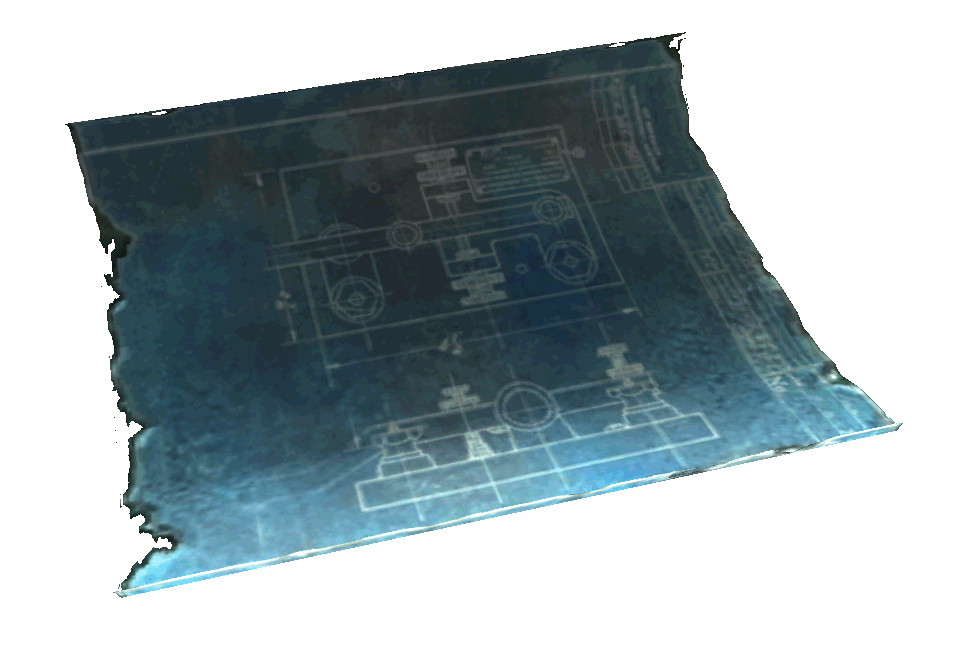
Design issues – Aside from the shoddy plotlines, the game suffers from several design flaws.
Scavenging Tedium – Throughout the time playing Fallout 4, it feels like the average player is going to spend about 75% of their time picking up trash. They decided to make a game where no item is junk. Everything you find, you need to pick up so you can scavenge it for parts to build your settlements up. This of course leads to frequent hair pulling as your inventory fills up reducing you to a slow ass walk (painfully slow to the point where you simply cannot deal with it). To add to the middle finger factor, you can’t even “fast travel” when you’re inventory is full to dump junk.
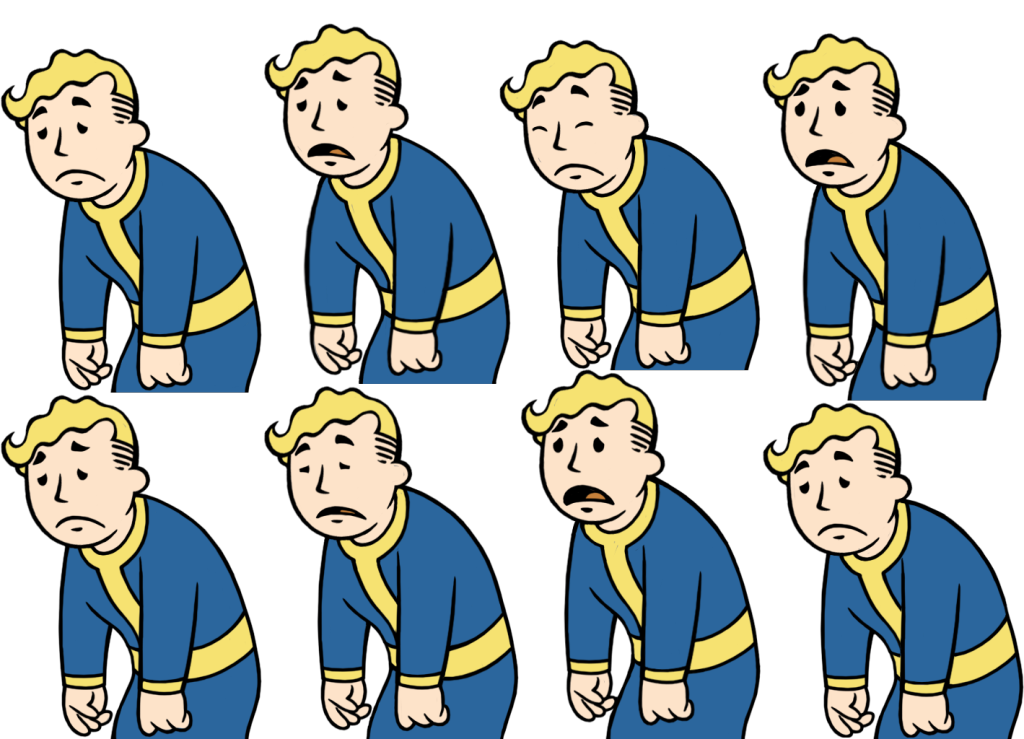
Fallout 4 – 5% questing, 15% inventory management 80% tedious.
Picking up all that crap is testicle-smashingly tedious. To add to the lolz, once you build up a settlement and trick it out with shops, turrets, buildings and whatnot – it serves no purpose other than playing in the sandbox. The game’s ending doesn’t change whether you have zero established/built settlements or 10. It doesn’t matter how built up you make each town. In something like 60 hours of play, I’ve had a settlement attacked once, got notified about the attack too late to get there in time (it said quest failed), and when I arrived there, the settlement was fine. No one dead, nothing missing, nothing destroyed… so why exactly are we scrounging for all this junk?
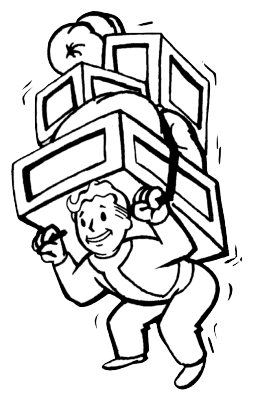
This is what the character really ought to look like.
Sometimes ‘cheating’ at games is not so much cheating as slapping an idiot designer to the side. After about a day of this drek, I decided to use the console to add crafting supplies just to play with town building without having to spend another 99 hours with a full inventory and hunting for one little screw. I built up a settlement or two, ringed it with turrets, and there it sat… completely pointless.
Limited weapons – The character I joined the Institute with is still using the very same 10mm pistol I started with in the first vault when I woke up. The selection of weapons in the game is gallingly lame. There’s no RPG-like progression to more advanced/better weapons as much as you’re expected to take the “gun nut” or “science” perks and modify/improve your existing weapons. Why add more models/variety to a game when the player can tinker with the current weapon and make it do more damage by replacing the ‘receiver’ of a gun. Two pistols using the same 10mm ammo, one does 18 damage one does 59… /scratches head.
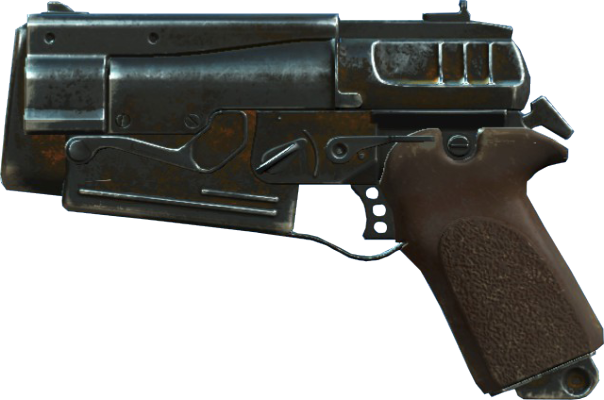
The only gun you’ll ever need.
Also, the selection of weapons and the way the game handles firing rate makes things laughable. The rifles hit hard with single bullets, but they’re bolt action – so they fire slow as hell. The combat rifle is a little better, as is the assault, but neither one of them can fire as fast as the 10mm pistol can. (As fast as you can click the button.) I find I’m doing far more damage with a silenced 10mm pistol than I can with heavy weapons, .50 caliber sniper rifles, or even automatic assault rifles.
Speaking of automatic weapons – for some inane reason, the same 5.56 bullet that does 90 damage when fired single shot does 28 damage when the weapon is made automatic. /scratches head. This, I don’t understand. In a setting where ammo is scarce, why would anyone ever want to use an automatic weapon when there’s such a drastic downgrade in damage per bullet?

This is a .50 cal next to a .308. I dunno about you, but I think that’s worth more than 20 points of damage.
.50 Cal – after drooling over the option to upgrade a sniper rifle from .308 to .50 cal for many hours of play, I finally got the gun nut perk up to the rank where I could… and the damage went from 127 to 141. O_o. Clearly, the people at Bethesda wouldn’t know a .50 BMG sniper rifle if it hit them in the eye. Considering the rarity of the ammunition, this was a sad and thoroughly pointless disappointment.
The weapons selection felt lazy to me. A lot of the thrill from an RPG comes from finding new weapons that are better than the ones you’ve got. Here, you get the perk and make it yourself… from a limited selection.
God Pistol – After playing around with various weapons (the fat man was idiotic… flies like a piglet launched out of a slingshot, and I hit a power armor right in the face with it and it didn’t even do a point of damage to him) – the inanity presented itself. The 10mm pistol is the best weapon I’ve found. It effects the highest damage-over-time of anything.
Coupled with sneak damage from stealth, it gets silly fast. Take Swann for example. (A giant mutant in the pond.) On my sniper character (with the supposed .50 rifle), I lined up a head shot, fired, and he barely noticed. Then, he proceeded to instantly spot me and chase me around, killing me over and over again until I wound up finding a space to hide in where he was too big to reach, and tediously killed him with a bolt action rifle shot after shot.
On my next character, I went stealth-pistols, and expected to have a hard time with Swann b/c the damage on the pistol at the time was about 53 compared to the 140 of the rifle. However, because of the fire rate, I levelled Swann before he took two steps.
Stealth – Well, this is a Bethesda/Skyrim game, so its “go stealth archer or don’t bother.” Like Skyrim, the stealth mechanics go from almost useless (everything sees you right away) to the point of ridiculousness where you can step on someone’s balls and they don’t notice you. I haven’t tried a non-stealth build yet since they don’t give you that much ammo.
VATS – the Vats system is their attempt to shoehorn “feeling like an RPG” into this game. It’s a quasi pause (it doesn’t actually stop things, just slows them to a crawl), and lets you target body parts and fire with action points like you were sorta playing a turn based RPG. The only problem is that Fallout 4 is a first-person shooter, not a RPG. This kludge does not fix that. You can have a 18% chance to hit something’s head in VATS, but land every shot in FPS mode doing it manually. Add to that, “crits” only happen in vats, and only when you hit the space bar to trigger one after filling your crit meter. Gone is the thrill of getting that random lucky shot.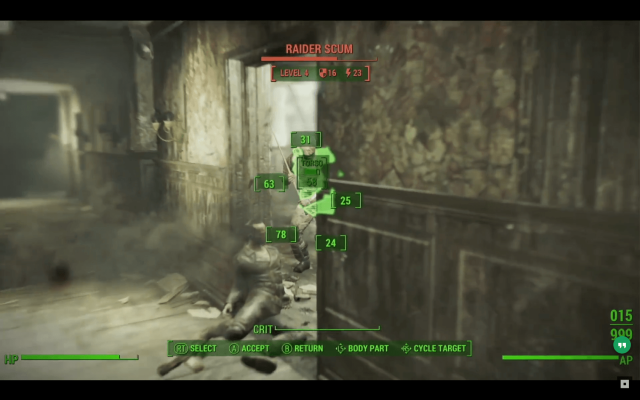
Oh, and another problem with VATS – if you’re next to an object? Every shot will plow into that sign post before it goes after your target.
Grenades – Lol. Don’t bother. If you throw a grenade, it will bounce off that fence you’re standing next to and kill you. Or, if you actually do get it to fly forward, all the enemies will use their ESP to detect the incoming grenade and run away from it before it goes off.
Offset targeting – This game is clearly designed to force you to play in first person. When you roll back the mouse wheel to watch over 3rd person view, all the targeting is ever so slightly offset to the left. Think you’re going to peer around a corner and shoot that guy in the head? Nope, your character feels the need to shoot the wall six inches in front of them rather than where the crosshair is pointing.
Not an RPG – Fallout 4 is not an RPG. It’s a first person shooter with a couple of extra bells and whistles added to make it kinda-almost feel like an RPG. I imagine the Institute killed a FPS and replaced it with an RPG? Nah… This game is dumbed down for the console people. The stats are largely useless (the biggest thing they do is dictate what perks you can have access to, and your carry weight.) Charisma unlocks a handful of dialogue options to bypass things more easily by talking. Perception affects your accuracy in VATS (which is completely useless if you are playing it like a FPS.) Agility affects action points (also largely useless if you’re not using VATS) as well as some effect on your odds of stealth. Since the stealth went from everyone sees me regardless of what I do, to I can stand 3 inches away from them and not be seen without a middle ground, it was hard to gauge how important.
By and large though, the stats felt like window dressing. (Hey, this isn’t really a FPS, it’s an RPG, see? We have stats!).
Skills – The game removed skills entirely. I don’t know how this got through the design phase. The Fallout series and Wasteland have been skill based from the start, and removing them just reinforces that this is not really a RPG, but a shooter based on one.
Power armor – Earlier I mentioned how sad it was that they throw power armor at the player so soon into the game. It’s no longer a sacred cow or an earned achievement. It’s a clunky mess that makes you feel like you’re walking around in a glorified trash can. I’ll give them one thing, the animation of getting into/out of the armor is pretty cool… but that’s about it.
I can’t say I’m a fan of the design of it, it looks cumbersome and unwieldy. (That, I freely admit to being an opinion, and as I prefer the stealth characters it didn’t feel right to be clunking around in it.) But, what lackwit knuckledragging mouthbreather decided to make the power armor require a short-lived battery, and then mount that battery in the middle of the back where the operator can’t reach it?
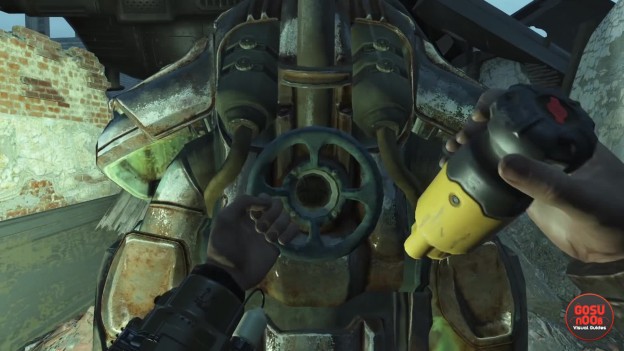
Anyone sneaky can come up behind a power armor and pickpocket their fusion cell, effectively taking the thing out. How in the nine hells did anything like that pass military testing without heavy bribes? In order to change the battery, the operator would have to get out of the armor (in a potentially dangerous situation) close it, and replace the soda-can sized pod before getting back in.) Granted, if you’re not alone, your buddies could do it for you, but it seems like a moronic design.
Plus, the batteries don’t live so long. It makes it more of a hassle to maintain the power armor. The only real benefit to them is being nigh immune to radiation when you’re inside one. Again to the pistol god, my 10mm pistol character rips through power armor in seconds. For all its supposed armor rating out the wazoo, a little pistol is shaving it off faster than a minigun can do it.
How can a 10mm pistol shred power armor when it laughs at a .50 rifle? Is there no concept of penetration / glancing? A 10mm pistol shouldn’t be able to scratch power armor… but then again, what Fallout 4 has isn’t power armor… it’s a trashcan welded to an exoskeleton. Wearable hit points. Power armor got left behind in Fallout 1 and 2 where it felt like a significant achievement that actually protected the user from damage… not like this game where it feels more like the marketing guy is saying “hey this really is Fallout… see, there’s power armor!” (then hides the crumbling wreck behind his back with a used car salesman’s smile.)
Ammo – If ammo is so scarce, how come enemies are always fully armed? And this is a complaint I’ve often gotten from players at tabletop games whenever I get the itch to run a post-apoc game. They frequently grumble about having to scavenge and manage ammo when the bad guys (who have a life expectancy of seconds to minutes) never have to worry about ammo. If this is a world in which it’s supposed to be a pain to find guns and bullets and the PC spends the entire game at a critical low ammo level, why does every bad guy you run into have a full load [and never seems to run out of ammo until you kill them and find their last 5 bullets?]
In conclusion – So yeah, as a rabid fan of Wasteland/Fallout, this game was a giant disappointment. Ham handed storyline with laughable mechanics, a dumbing down of the RPG elements to the point where it can only barely be called an RPG, and a thoroughly unfulfilling ending (every faction choice feels like you’re picking the bad guys), makes this game something else. Something else in that it is not part of the Fallout universe. Someone made a shooter and slapped Fallout-inspired graphics on it, scribbled off a half-assed storyline on a piece of toilet paper, and gave us a sandbox full of stuff to shoot at.
And oh yeah, there’s nuclear explosions.
